#pose season 1 episode 1
Text
as someone currently watching tng for the first time (only in season 4), it is a little odd when i see fans say that "no one ever recognizes data having emotions." like data denies it, but so often the moments when he's explicitly denying them are when he's talking with a character who's like. "yeah the thing ur experiencing is normal humans often (mourn/doubt themselves/whatever)" and WHEN data denies it they just kindof. give him a look tht to ME reads like his emotions are just an open secret for everyone else and theyre not gonna fight him on it. theyre not generally acknowledged, but like, i dont think ive seen a bridge member outright deny it except for deanna before the beard bit (tho idr her exact wording), and tht was early on.
#plus in tht same conversation geordi literally poses the idea tht data might be experiencing self-consciousness#like cmon now. these characters arent All denying his capacity for emotions#LIKE! doesnt even pulaski say hes acting insecure or w/e after he loses tht game of strategy she set him up to do?? pulaski who struggles#to be PC about his very personhood? cmon now...... come ON#tng#data soong#also i am watching the show chronologically and i did start at season 1 ive found thts not wht most ppl recommend but i prefer it and will#be continuing 👍 i never care abt spoilers tho so if there are any episodes relevant to this feel free to talk abt them in detail#it speaks!
34 notes
·
View notes
Note
OMG you like moral orel?? who is your favorite character :]c *Blinking and fluttering my eyelashes beautifully*
i watched the whole thing in a few days, ended yesterday. My faves are nurse bendy and joe (together and as a unit), stephanie (individually and then as a unit with the reverend but i dont like him individually), + danielle, of course
#idk how to feel about it in general i know there was more planned but it got cancelled but it still ended too suddenly ykwim#i liked what we saw at the end with orel finding family elsewhere (before he grows up)#i like orel himself outside of the wacky edgy adult themes of it all as a Kid who is Good#when i was watching that last episode i got a bizarre kind of emotional bc when he first poses the Big Question i Knew#that the answer was that the only good thing abt his father was that he had a hand in making him#i get so sad with stories involving children like dis 😭#i feel like even if it was fully complete the show had more potential ykwim....i know the Tonal Shift makes the impact more...impactful#but i feel it cldve been handled differently or in different amounts. idk!#skunk mail#pawzcore#i also get its bc the eps are short but nature 1 and 2 didnt impact me the way it did others#like. idk. i knew beforehand it was the serious moment(s)/episode(s) but it wasnt presented in a way that#actually shifted My mood when watching it...clay's nonchalance from the eyes of me as a viewer#just comes off as humorous rather than serious ykwim? not that its funny but it doesnt feel high stakes at all#the whole thing didnt feel high stakes or serious unless u remove it from the context of the show youve been watching#for 2 seasons#its fucked up when you see it on paper but then in the show its different....if that makes sense
17 notes
·
View notes
Text

daily dose of granada holmes: sherlock wields a fire poker
november 16, 2022
#that’s a pretty fancy pose#and the fire poker really adds to it#daily granada screencap#sherlock holmes granada#granada holmes#Sherlock Holmes#sherlock holmes 1984#season 1 episode 5#the crooked man#acd sherlock#acd sherlock holmes#acd holmes#jeremy brett holmes#jeremy brett
120 notes
·
View notes
Note
(italian anon) my favorite episode from season 3 is actually miraculer even though it's bad because i was so silly to think they would have written a realistic antihero arc for chloe XD
miraculer is still in my top three S3 episodes bc as a standalone it's just SO good ??? from the animation to the plot to the fight itself it is one of miraculous' BEST episodes and one of the reasons i believe S3 to be its absolute peak . that said it's ridiculous to look back on chloe's character at the time and completely deny she ever had any depth i swear no one in the crew has watched a single S3 episode
#italian anon#the top three goes 3. miraculer 2. heart hunter 1. feast btw#i have a thing for the first half of the season finales ... they end up fucking so much more than the second half always#also @ the time S4 started airing i often said that it seemed like they ignored all the seeds they planted during S3#like . immediately breaking up the ships they had JUST estabilished or posing lila and felix as threats#like S3's last 5 episodes so somehow come back later on but not in the way you would think#and it sucks . bc again i love S3 it is my favorite season and S4 did it so dirty . such a huge disservice
3 notes
·
View notes
Text
One thing that’s really rubbing me the wrong way about some people’s reaction to the ending is the way people are talking about Wille. I see comments that essentially imply he is nothing without his privilege backing him, that he has no personality outside of his relationship with Simon and he’s gonna be in for a rude awakening after the ending when he realizes the attention on him isn’t gone just because he’s giving up the title of Crown Prince and life as a normal person isn’t going to be an easy or smooth road.
To me it seems like the message has completely gone over some people’s heads.
No part of me felt while watching the ending that everything is now resolved and Wille will live happily ever after without any adversity ever again… No?
The point is he finally has a choice where he ends up.
Wille literally explains this to the Queen in the final scene - that he’s never felt like he’s had a choice. He didn’t choose to be born into the royal family, and as he points out to his mother, neither did she. The public didn’t choose who inherits the crown. None of them chose it. Wille wants a choice. By staying in this role and doing what is expected of him simply because it’s his birthright is exactly what Wille is actively fighting against.
Another common thread I’ve seen thrown around is that Wille has no personality outside of Simon and I think people need to realize that one’s hobbies and interests do not define their personality. Wille very much has a personality and he had one before he met Simon - he’s always been the type to question the status quo and why things are the way they are. In season 1 episode 1, before Wille meets Simon, we see Wille scoffing at being made to mingle and pose for photos with people he doesn’t know and we see him telling Henry and Walter they’re allowed to have their own opinions when they mindlessly agree with everything he says. If anything, he starts losing this side of his personality because of the restrictions the crown puts on him. Wille falling in line with his expectations throughout the series takes him further away from this side of himself that’s always been there. We see how detrimental this is not just to his relationship with Simon, but with Wille’s relationship with himself. How exactly is Wille supposed to find what he’s passionate about when he’s consistently being told that these are the things he should care about, this is how he needs to look to the public? This is all a very intentional narrative choice to demonstrate why Wille staying in his role is detrimental to his mental health and his ability to grow personally.
The ending is not saying “everything is fixed now and Wille will have a totally adversity-free life with Simon.” Nothing is fixed and nothing is certain, but at least he made a choice. He’s going to stumble and he’s going to continue to make mistakes and a life path is not going to construct itself for him, but at least he now has a choice. He doesn’t have to pick a hobby or interest that’s considered suitable for him. He can get tattoos if he wants to. He can get married or not get married. He can have kids or not have kids. He can go to university and study whatever he wants, and yes, he will still have his family’s money. He’s not gonna be destitute and that is indeed a privilege that Wille is aware of. Should he stay in a role he doesn’t want simply and that makes him miserable because he’s privileged? For all we know, maybe his family will cut him off and he’ll literally be on his own, and that’s a risk he’s willing to take to be, in his mind, free.
The public is not suddenly going to lose interest in him, but at least he won’t have to concern himself with the royal court dictating how he and Simon act or appear. He will no longer feel like he needs to control how Simon conducts his social media presence. It’s very clear in s3 that Wille is not personally upset with Simon for posting the song or the picture with the little boy at the worker’s March - he smiles when he sees it - but that he’s worried what the royal court is going to think about it.
As far as the idea that Wille giving up the crown at the end was indeed for Simon because Wille has no identity without Simon, I really don’t think this is fair to say at all, because Wille was unhappy with his position even before he met Simon. He hated that he couldn’t even do something silly and reckless without issuing an apology. He hated that he had to uproot his entire life because he made a mistake and his family was trying to save his image in the eyes of the public. The thing is, before he met Simon, and before the events of the series, Wille didn’t feel like he had a way out, and funnily enough, that’s for the exact same reason people are dunking on him for now - because it’s the only way of life he knew. He didn’t see a way out and it’s through being with Simon that his extremely narrow view of the world gets challenged and he’s finally able to see a way out. Did Simon inspire him to do what he did? Of course he did. This entire concept is materialized through the scene where Simon tells Wille that he never had a choice who he was born as and that he sees how the monarchy makes him feel. To say that Wille gave it up for Simon implies, to me, that Wille would’ve been happy in the role if not for Simon, which I don’t believe is true. He’d still be miserable but perhaps feel less like he has the agency to do things about it. Getting to be with Simon at the end is certainly a big part of why he did it, but that also just kinda goes hand in hand with his own personal freedom, doesn’t it?
I find it kinda funny how much the internet preaches that it’s never too late to figure out who you are or what you wanna do and I see people acting like Wille is somehow doomed because he’s a 17-year-old without any interests or hobbies. Wille’s entire struggle is with having his life completely mapped out for him and it’s like with him giving up his role people are now questioning the fact that he doesn’t have an entire life mapped out for himself. I spent my time when I was 17 blogging on tumblr and doing nothing else and didn’t go to college until I was 24. I’m 29 now and I’m still learning what I’m passionate about. To treat Wille’s lack of hobbies or interests as some kind of moral failure or indicative of a lack of personality really, really bothers me and to me his lack of interests and hobbies has always been a very intentional writing choice, and the ending, if anything, gives him all the time in the world to figure that out. He might even develop an interest and then realize it’s not for him! The amount of people I know that went to college for what they thought they wanted to do then dropped out because they changed their mind, or graduated from school, couldn’t find a job, and then went back to school for something else is endless. This is all part of the human experience and it’s going to be an entirely new journey for him, but that part of his journey did not a part of this particular story, and in that way, the ending is open. It also helps that regardless of Wille’s wealth and privilege, education in Sweden is FREE.
In the end, the message of the ending is exactly what Boris said to Wille in season 2: we can’t choose who we are born as, but we can choose how we want to live, and that’s exactly what the ending is saying, and that’s what Edvin meant when he said the ending is open. Wille’s road is not suddenly going to be perfect and easy, but at least all of his choices, including his mistakes and struggles, can be entirely his own.
434 notes
·
View notes
Photo
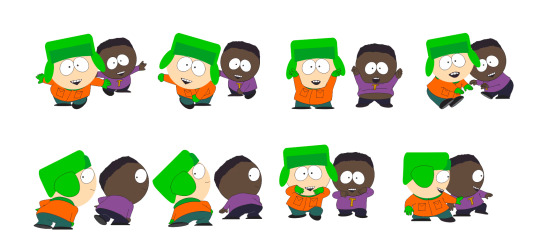
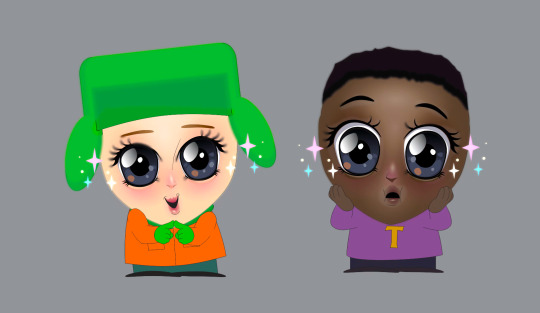
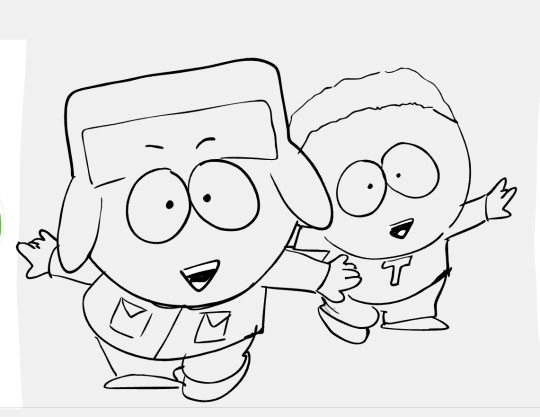
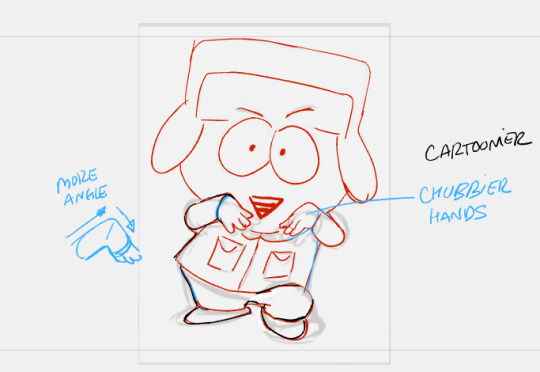
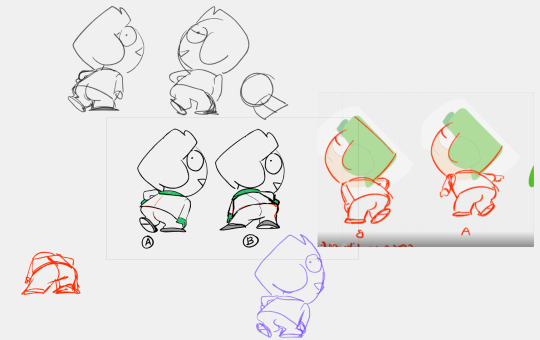
This past week we premiered Season 26, Episode 1, Cupid Ye! Here are some dancing poses based on The Pretty Girl Walk tiktok trend done by Keo, George, Greg, and Angie. Here is the ultra cute(and ultra creepy) cutie face filter on Kyle and Tolkien done by Shaina.
3K notes
·
View notes
Text
One thing that really frustrates me about Viv's work is how she handles her villains. She has a love for wacky/Saturday morning cartoon villains, which, fair- I admit I like them too. But the issue is ALL of her villains are this- all of her villains are either goofy Saturday morning cartoons or complete idiots, neither of which end up posing an actual threat to the cast. Like, seriously- let me go through every villain in Hazbin/Helluva so far.
Stella: Treated as incompetent by the narrative
Robo-Fizz: Dead
Verosika: barely even a villain- if anything she's more just a rival
CHERUB: Kicked out of Heaven in their first appearance so they can't be a threat to IMP, and they haven't shown up since their first episode
DHORKS: Same as CHERUB- portrayed as incompetent and haven't shown up since Season 1
Striker: WAS an actual decent threat in Harvest Moon Festival....but then Western Energy ruined him and made him into another dick joke vehicle.
Fizzarolli: an actually decent rival to Blitzo in Ozzie's, but he needed WAY more episodes before hitting the big emotional arc in Oops and hasn't been portrayed as a villain since Ozzie's
Asmodeus: same as fizz- seemed intimidating at first, but he hasn't really....been portrayed as a bad guy since Ozzie's.
Chaz: Joke villain who's just a more annoying Blitzo and he's dead now so
Crimson: Had the POTENTIAL to maybe be a threat, but was already treated awfully in his debut episode, and was handled even worse in Oops
Andrealphus: Introduced out of NOWHERE and has barely done anything/we've had no time to absorb him as a threat
Barbie Wire: RIDICULOUSLY flat and oh yea is an Actual Predator for the sake of a bad joke
Glitz and Glam: ....why do they exist again?
Mammon: an ACTUAL THREAT AGAIN, but even THEN he's still portrayed as goofy/incompetent
As for Hazbin's villains...
Lucifer: Goofy Dad
Vox: Goofy Villain
Valentino: Goofy Villain Who's Also An Actual Rapist
Velvette: ....does she even count?
Adam: Annoying Dickhead Fratboy who's more irritating than intimidating
Lute: Honestly the most potential of anyone here but she's still pretty boring
The issue is Viv wants all her villains to be Team Rocket, but she forgets that Team Rocket was Never Taken Seriously. Minus the Unova anime, When it came time for a serious threat, there was always a new villain introduced for the movie! They knew they couldn't have proper stakes with them as the main baddies, so they weren't! Viv just doesn't understand that you can't have all your villains be Jessie and James if you're trying to go for a serious story like she is.
#hazbin hotel critical#helluva boss critical#helluva boss criticism#vivziepop critical#helluva critical#helluva critique#helluva boss critique#vivziepop criticism#hazbin critical#hazbin critique#🐟
386 notes
·
View notes
Text
Ineffable discontinuity and the Bentley's roadtrip transformation: new back doors and other changes (after it was yellow), and Crowley... didn't notice?!*
*Also, as a side observation, did he leave the Bentley window open during the ball and everything that happened after? Why?
Have you been longing to be even more perplexed by the ineffable discontinuity of Good Omens season 2? Do you love endless data in the form of screencaps? If so, then please join me on this wild ride! Here are some highlights:
Top photos: Season 1, episode 6, after Adam reboots reality; S2e2, before Aziraphale's e3 road trip. The Bentley is a gray and black 2-tone car with 2 doors (only 1 handle is visible on each side).
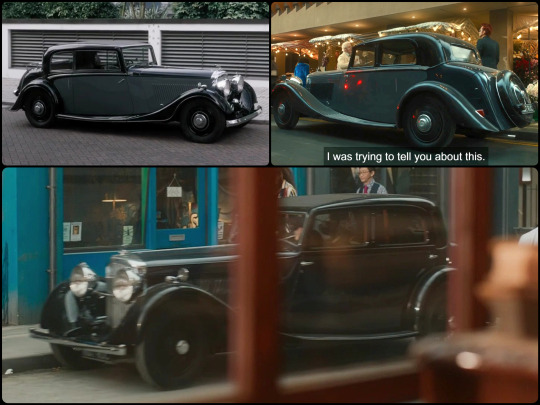
And on the bottom is s2e5, while Crowley is driving, it's a solid black car with 4 doors and smaller silver hubcaps.
(edit: For those of you thinking about the different Bentley models used in s1 vs s2 (discussed in detail below), or the difference between the full car and half car set, just those three full car pictures above demonstrate that the new s2 Bentley model is NOT the reason for this mid-season shift. For more details about the half car set plus other ways to tell the Bentleys apart - without talking about color - see my newer post with handy diagrams, here.)
And the s2 interior?
Here's e1, after Crowley talks to Shax, and e3, as Aziraphale arrives in Edinburgh (which is also when the Bentley debuts as a 4-door). And look at this blocking - how both characters are posed so similarly with their backs to us in these shots!! It's so deliberate! :

And look at the seats! In e2, Crowley is talking to Shax again, and in e5, Crowley just parked the Bentley before the ball:

When Crowley, who is so tuned in that he senses the car is yellow and driving too slow even from a distance, sees the "new" Bentley in e4, he doesn't act as though anything has changed, he just happily and purposefully walks up and opens the back door that was never there to put his plants inside.
THE BACK DOOR THAT WAS NEVER THERE
For that matter, Crowley and Aziraphale both seem to be unaware of the changes! This feels like both a metaphor and a functional plot device for season 3. There's more discussion at the end of this post!
Thanks to comments and observations awhile back from @bbbitchvibbbez , I did some careful searching for s2 scenes featuring the Bentley, and this post is the labor of love and irrational obsession result!
If you want to see lots more Bentley screencaps and discussion, including Crowley nonchalantly using the new back door, and possibly also leaving the Bentley window open during the ball and everything that followed, please keep reading:
Some background and context:
Ok, so there was a different Bentley "actor" for s2. The s1 actor was a 2-door, the s2 actor is a 4-door. If you look carefully, you'll see that in s1 the backseat side windows are smaller than the front side windows. In s2, they're the same size. I talk more about the windows - with handy diagrams! - in my newer Bentley post, here.
There's also been some controversy about the interior color of the s2 Bentley, black vs brown, and how that could relate to the s2 body swap theory; here are details about that from @lonicera-caprifolium and @picturesque-about-it. I don't think my findings support (or disprove) that theory, but take a look at what I found and see what you think!
(*Please don't ask Neil about any of this, he's already given us the answers he wants to give, and he's not going to spoil the surprises in s3 now by telling us what's really going on!*)
Here's the episode/scene breakdown:
S2e1 on the street with Shax - gray, two toned, two doors (one visible door handle on a side), brown interior - both the seats and the inside panel of the door. Notice how the door is hinged at the back, and opens opposite the way most modern cars do (this is called a suicide door):

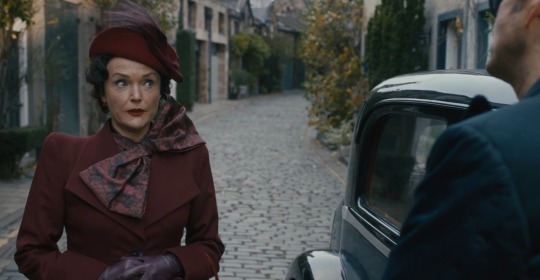

More s2e1 photos, the Bentley is in a lot of scenes this episode and as far as I can tell it stays the same gray 2-door for the whole episode, but it's frequently in dark lighting to make it harder to tell it isn't actually black (I've brightened most of these shots). It also has larger silver hubcaps, and I notice consistent brown seats (these interior pics are from three different scenes):
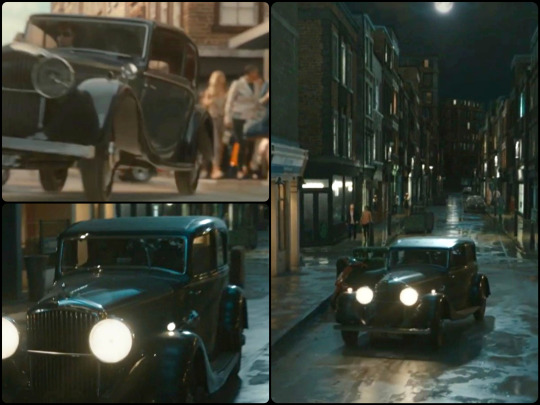
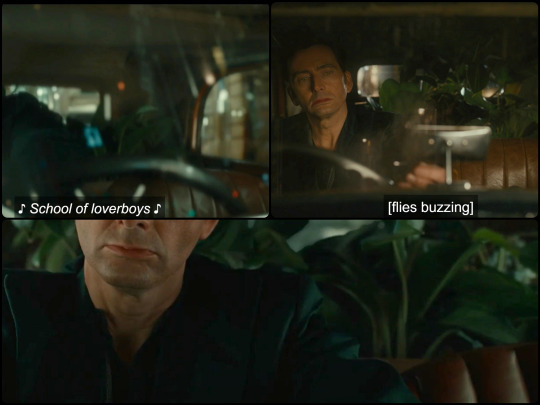
In s2e2, the Bentley is only in two scenes, and it's the same as s2e1. Now, you can see in the larger photo below that it's obviously not the SAME as s1 - the backseat side windows are too long - but the production team DID try to make the new Bentley "actor" look the same as in season 1. It's a gray 2-tone car with 2 doors (1 handle visible on each side) with larger silver hubcaps. As an aside, what's with the red lights on the car in this shot?? I mean, yes, it's a reflection of another car's brake lights, but why put that onscreen?
Also, in case it's relevant, Crowley is wearing his turtleneck throughout this episode, and still has the silver-sided glasses from e1:
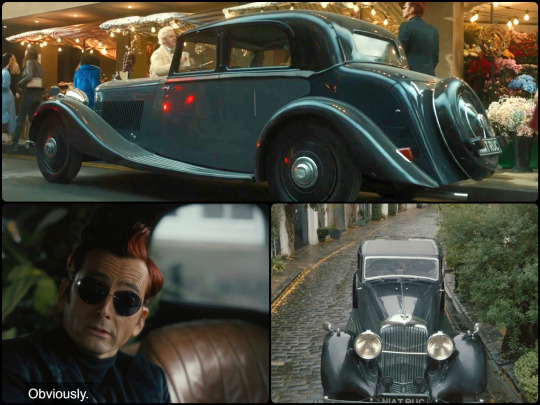
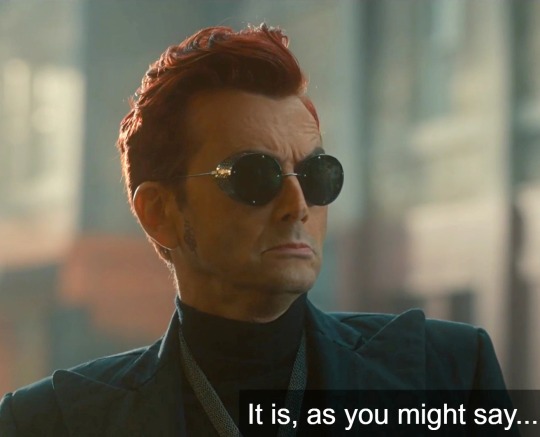
Ok, now we have s2e3, and as Crowley meets Muriel and gives Aziraphale his car keys, we see he's no longer wearing the turtleneck, AND this is when his glasses change to black-sided ones:

Outside, we see the Bentley looks the same as the rest of s2 thus far, as Aziraphale sets off for Edinburgh. Gray 2-tone, brown interior (with window bullet hole decals very visible), with larger silver hubcaps. There's only one handle visible, so it's still meant to look like a 2-door:
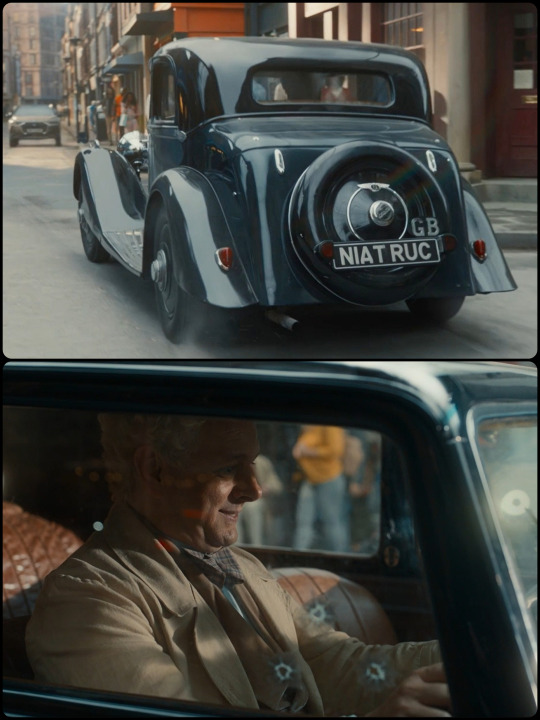
Ok, here's where things start to change! Azi is driving and the Bentley is yellow. The seats might (?) be black, there's still only one door handle on the side, the silver hubcaps are still larger. But when he "changes it back", NOW it's black:
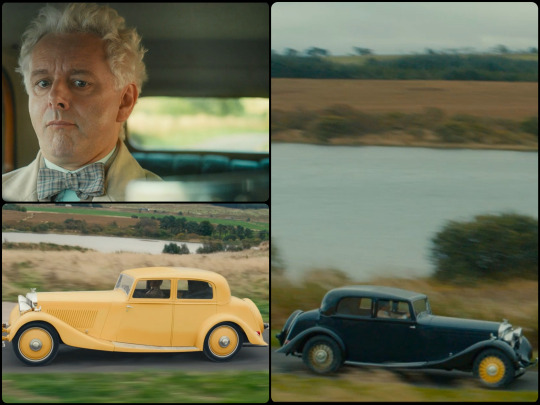
And by the time he pulls into Edinburgh, Transformation Complete. (Did Something Else Happen?? Or is this an effect of Aziraphale finally being welcome to take care of this extension of Crowley? More speculation at the end!) It's a black 4-door, two handles clearly visible on the side, with smaller silver hubcaps:
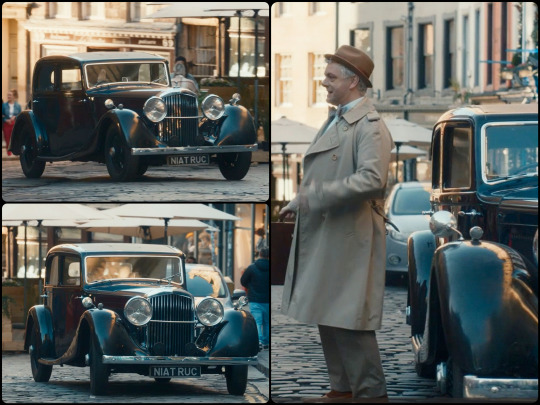
And the interior? The door panel, at least, is black now - and it has a texture that wasn't there when it was brown. Here's e1 next to e3 (and appreciate, again, this very intentional parallel blocking of the two actors!):

In s2e4, we see the Bentley in two scenes; at the beginning when Aziraphale meets Shax-as-hitchhiker, where we see the bullet holes and the black door lining, and at the end when the Bentley is reunited with Crowley:
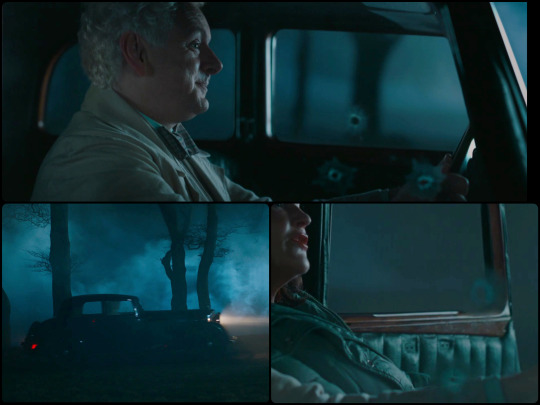
When Aziraphale parks the Bentley back at the bookshop, we see the bullet hole decals and that it's still a black 4-door:

So he goes to meet Crowley, they come back with the plants. We can see that the camera is to the rear of the car, and the front of the car is to their left. They're standing on the left side of the car. If Crowley opens the door, we won't see the interior door panel, right? Because the Bentley doors are hinged on the back, instead of the front, so the door will open towards us:
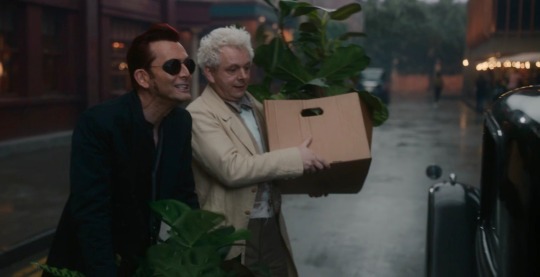
WELL. Mx "I can feel when you drive below the speed limit" and "change it back!" Crowley very eagerly walks up to the BLACK car, greets it with some sweet baby talk, and then opens the suddenly-existing BACK door with a hinge on the front (so it opens away from us) as if this is All Perfectly Normal, and we can (barely) see the door lining and it's BLACK and textured:

A few more shots of Crowley, standing at the brand-new back door of the Bentley, still wearing those black-sided glasses:

And in case you're wondering, in s1e2 when Anathema gets a ride in the Bentley, she climbs into the backseat from the front driver door, and she climbs out through the front passenger door. There wasn't a back door on either side. Here she climbs into the Bentley, and you can see Crowley fold down the front seat, and there's clearly only one door on that side, and it's hinged at the back. (When she gets out on the passenger side, it's harder to see, but you can tell that door is also hinged at the back.) :
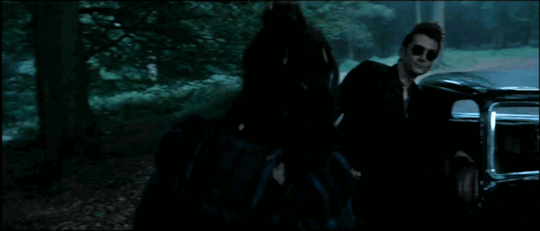
In s2e5, Crowley drives the Bentley to the bookshop, and then we only catch a few small glimpses of it while Aziraphale is recruiting shopkeepers to the meeting/ball. Here's Crowley driving the black 4-door Bentley with small silver hubcaps, and here he is getting out of the car with black seats. The front door is still hinged at the back, as it always has been. The window is open - his hand is reaching through to open the door - so we can't see the bullet hole decals:
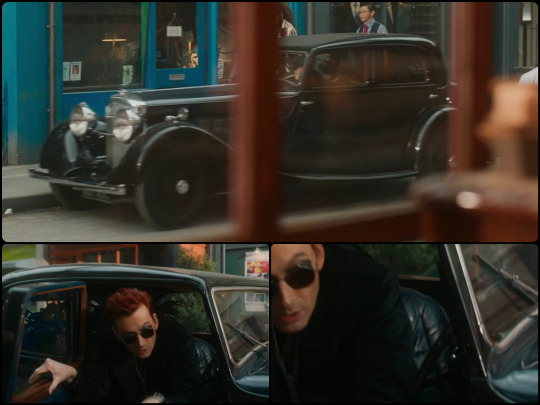
The next time we see more than a hint of the Bentley, it's the end of s2e6 and Crowley is standing next to it, watching Azi leave with the Metatron. It's still black, with 4 doors and black seats and smaller hubcaps. We don't see the bullet hole decals, but perhaps the window is still open from when he parked it in e5? (And WHY would he leave the window open? Was someone supposed to come by after he parked it to deliver something to the Bentley, or take something out?) Emotional photos ahead:


I over exposed that last picture, to make the colors really easy to pick out. The seats are absolutely, definitely black.
So... what does it mean? Why did it happen, and why didn't Crowley notice or react?
I love the metaphor that Aziraphale subconsciously created a back door for - or into - Crowley, especially with all those references to the "back channels" of communication between heaven and hell. I'm thinking it could represent - or actually be - another way for them to communicate, or like another entrance to his heart; it's something that Aziraphale doesn't realize he changed or added and that Crowley hasn't noticed yet either, even if he's making use of those changes on some level. I'm sure other metaphors could also fit!
And I'm reminded of something @theeminentlyimpractical said, "Crowley, despite his whining, fully accepts the idea of "our car," which fundamentally transforms the Bentley". That post was liked by Neil, so there could definitely be something to this "our car" transformation line of thinking.
So, was the transformation a subconscious effect of Aziraphale finally being welcome by Crowley to drive the Bentley, and caring for and taking responsibility for this part of Crowley? Or did Aziraphale consciously do this, or did Crowley? Or maybe the Bentley is sentient, and it chose to be bigger/different now, to accommodate both of them. Or did the change happen in response to Something Else We Didn't See?
Is Crowley's (and Aziraphale's) apparent non-reaction another example of an unreliable narrator or some memory tampering? Is manipulation of the Book of Life involved? Are there multiple timelines? Is someone time traveling? Or is it just that Aziraphale and Crowley already discussed the changes off screen, before Aziraphale left Edinburgh?
If Crowley noticed the changes, I would have expected a comment about them. Either, "change it back!" or a reluctant, "those are changes I can live with", or... Something. But instead, the production team went to some trouble to make sure the hints are there, but hard to spot (you can review the similar, careful s1 hints about the appearance swap here, from @fuckyeahgoodomens); as opposed to, for one example, the way they very clearly pointed out Maggie's mysterious spelling mistake, both on screen and in the dialogue. So I feel reasonably certain the Bentley's transformation is a careful, subtle hint about a Secret Something Important That Will Be Revealed In Season 3. I think it's both a metaphor and a plot device*.
What are some of your favorite metaphors? Your most reasonable theories? What about some of your biggest, wildest, most improbable theories?
*And if you enjoy Good Omens metas, theories, clues, etc, I have a big pinned collection of those from the fandom, here!
#Ineffable discontinuity#the mystery deepens#good omens meta#good omens analysis#good omens bentley#bentley#Bentley transformation#Good omens Bentley transformation#good omens theory#Clue with a capital C#good omens screencaps#crowley good omens#aziraphale good omens#good omens#good omens season 2#good omens 2#good omens spoilers#renew good omens#love#ineffable lovers#ineffable partners#ineffable soulmates#ineffable husbands#Good omens mysteries#Good omens clues
422 notes
·
View notes
Text
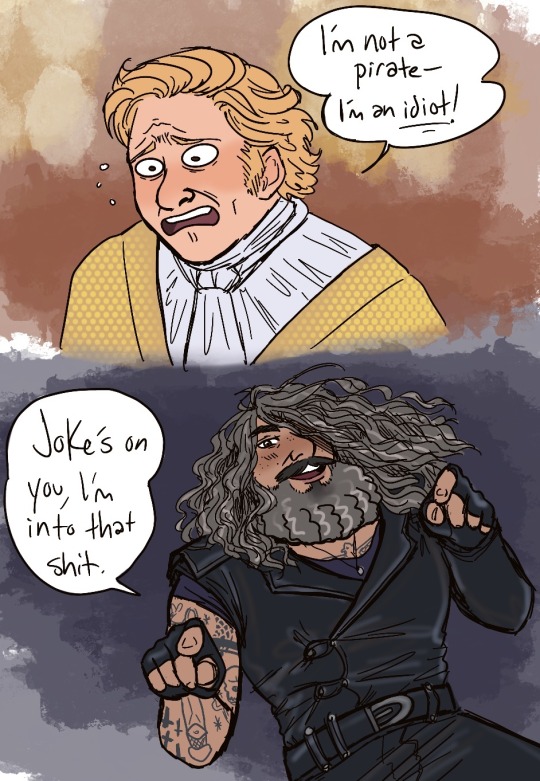
[ID: 1. Shoulders up of Stede in episode 1, wearing a white blouse and cravat with his yellow ‘battle jacket’ sliding off one shoulder. He is mid-crisis, eyes bugged out and mouth screwed up in a sob, exclaiming, “I’m not a pirate! I’m an idiot!” 2. Waist up of Ed posing with one leg up like his introduction in episode 3, hair blowing dramatically in the wind and covering half his face. He grins confidently, pointing with both forefingers at the viewer as he says, “Jokes on you, I’m into that shit.” /end ID]
Season 1 recap
4K notes
·
View notes
Text
Obsessed with this scene and will be forever; A very long meta.
Your ‘exactly’ and my ‘exactly’ are different ‘exactly’s’
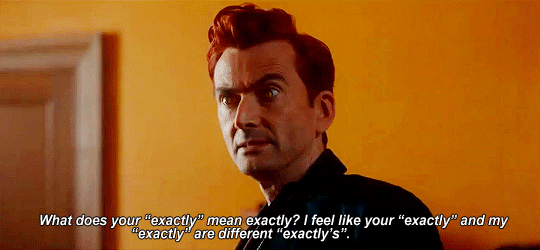
The Scene.
Crowley’s exactly means “We need to be safe and together and away from danger. Let me keep you safe.”
Aziraphale’s exactly means “We need to help because it’s the right thing to do, and we fix things when we’re together.”
Note though, that this is the only time they clarify with each other, and they don’t actually say what they mean, they say what they want to do.
“Let’s drop him off and leave him.” Vs. “Let’s take him in and help him.”
The dissection of this also poses the question, Why does Aziraphale think helping Gabriel is the right thing to do?
And the answer is; Crowley gives him the courage to do what Aziraphale thinks is the right thing and not what heaven decrees is good.
And we can come to this conclusion because Aziraphale for the first time ever, immediately and without hesitation, goes against heaven’s will, without having to be convinced or going through a cycle of indecision or guilt. This is… A. Big. Deal.
Season One.
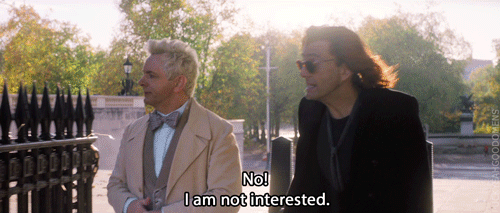
Heaven’s good requires Armageddon to be complete, and under-way. And what does Aziraphale first say about it? “It’s all going to be rather lovely.” “I am not interested[in stopping Armageddon with you].”
Aziraphale loves the earth in this scene. He loves the people on it. He loves all the creatures great and small. He loves Crowley, too. And he still refuses. He needs Crowley to convince him, and even then he still thinks heaven will see sense once he fixes everything. He still believes that right, and good, and holy are the same thing. Even if sometimes he doesn’t agree with it.
Now, let’s go through some history. Between the two of them, for sure, but mainly Aziraphale’s.
An act of defiance; The giving away of a flaming sword. The guilt and worry Aziraphale feels after giving Adam and Eve a chance at survival is not something he gets over quickly. He worries that it was the wrong thing even though it felt right. And the problem isn’t the system that would make doing a good deed the wrong thing, the problem is him. The problem is Aziraphale.
Compliance; The flood. The crucifixion. “God’s a bit tetchy” he says before Mesopotamia is decimated. Aziraphale is clearly uncomfortable with the will of heaven here, but he does not disobey. He does what he is told because the will of God is good and right and correct. He does this same thing with the same reasoning during the Crucifixion of Jesus in 33 AD. Crowley gives us context with a few lines, “Your lot put him up there.” “I showed him all the Kingdoms of the world.” We see a demon who still doesn’t understand why good is so cruel, and knowledge is so evil. And we see an angel that refuses to be conflicted despite his own inherent morality. Because Aziraphale understands why Crowley has questions, he has them too by now. However, Aziraphale has something Crowley didn’t; he has the knowledge of what good intentions and well-meaning questions get an angel.
Doing bad in order to do good. Let’s talk about the Job mini-sode, because let’s be completely real; I’ll never be done talking about the Job mini-sode.

Aziraphale starts this episode thwarting evil. Something he is not conflicted about. You have to thwart evil when you’re good. That’s the whole dance at this point. Crowley stops the dance though, he presents a permit. A permit from a higher authority. Meaning that Crowley, the demon, is performing the will of not only Hell, but also of Heaven. A theme that IS THE WHOLE POINT OF SEASON 1. For all their want of a war, heaven and hell want the exact same thing.
Crowley even states, “The real ‘Big One’ will be between ‘all of them’ and ‘all of us’”. At the end of Season 1 Episode 6.
Aziraphale is horrified by this “permit”. And he goes to check on the validity in heaven, and well. He finds out that it’s real. He doesn’t go higher after that, because he knows you don’t question. He knows he can’t ask why? So he goes to Crowley. If Crowley doesn’t do the evil thing, then Aziraphale doesn’t have to break the rules to thwart it. And well, even though Crowley is a demon, Aziraphale doesn’t actually see him do demonic things all that much. Aziraphale still thinks that Crowley acts like an angel. He’s even starting to think that Crowley is on the side of good. Good being heaven. Crowley denies this, but Aziraphale doesn’t listen. Crowley says, “Kill the blameless Children of Blameless Job” and Aziraphale isn’t going to stop him. The demon has a permit after all. But then something miraculous happens.
A crow, bleats.
Aziraphale looks at a demon defying heaven, defying hell, and doing good. He doesn’t know it yet, but this is his first glimpse of their side. At this point, Aziraphale still thinks Crowley is a little bit on heavens side, because the demon is a little bit good. But then Crowley keeps saving the Children. Crowley stands before angels and he lies to save the children. He does something bad to do something good. And then.
So does Aziraphale.
An angel lies to save children. And then that angel thinks that decision is his undoing. He readies himself for a fall that never comes. Because Crowley is going to keep his secret. This is where Aziraphale once again starts acting with his own moral code. It’s important to remember something important though. Aziraphale still thinks he’s the one who’s wrong. Not heaven. The birth of “their side” coincides with the saving of Job’s children. But there’s a problem.
It doesn’t mean the same thing to each of them. To Crowley it means and end to his loneliness. To Aziraphale it means the beginning of his millennia long struggle of reckoning good with right. Their “exactly’s” don’t match, and they don’t clarify with one another.
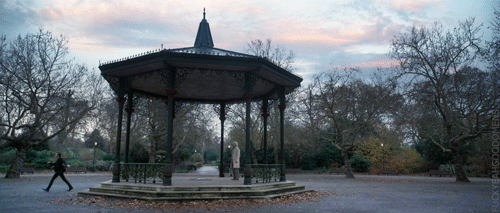
The Book and the Bandstand; Aziraphale doesn’t tell Crowley. He doesn’t say, “Let’s go save the world, I found the anti-christ” He says, “Why would I know his shoe-size?” And Crowley doesn’t suspect a thing. Ouch. They disagree on how to continue. Crowley wants to cut their losses and run away. He wants to do this because he thinks they’ve already lost. And Aziraphale doesn’t give him a reason to hold on because despite everything, Aziraphale wants to be good in the heavenly way. He wants to give heaven a chance to do good, too. A higher authority will surely agree with him. And now, he has the courage to ask. Only after he is turned down by heaven does he make his own decision. He steps into ‘their side’ safely, because Crowley had built it that way.
And he saves the world. With Crowley, and the Anti-Christ, and a series of human beings.
Aziraphale retreats to the safety that Crowley has built for them and that he himself has built as well, despite constantly looking over this shoulder. And he finds comfort there. It is the entire reason he finds himself comfortable making his own choices in Season 2, regarding what is good. It’s why he helps Gabriel, and it’s how he gets Crowley to do it too.
You might even say that Aziraphale embraces ‘their side’ more than ever in Season 2. He includes Crowley in all of his plans, excitedly tells him information he finds, calls the bookshop, the Bentley, and their existence, ours. Oppose this directly with Crowley who, in the name of keeping Aziraphale safe, actually just keeps him in the dark(The threat of extreme sanctions, Gabriel’s trial, etc.)
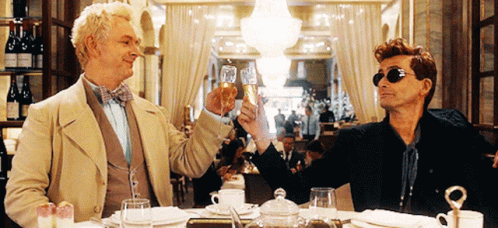
Exactly vs Exactly; AND STILL THE ENDING MAKES SENSE. I have a whole meta HERE about the reason Aziraphale made the decision he did, but I want to talk about it a little bit more. Because it’s the same problem. Their “exactly’s” are different, and neither of them asks the other to explain why.
In this particular case of the ending scene of Season 2, in place of the phrase “exactly” they use the word “together”.
Aziraphale wants Crowley with him in heaven, because they fix things when they’re together. And Aziraphale has faith they they can fix heaven. “We can be together” is how he presents it to Crowley. Crowley rightly sees this as naive, and he’s upset that Aziraphale thinks he wants to be something he’s not anymore.
He finds it hurtful that Aziraphale wants him to change.
“We can go off together” Is what Crowley counters. He says all of this is awful, please let us go off somewhere the danger isn’t. Let me keep you safe. Aziraphale doesn’t want to run away. He wants to save the world again. He wants to save it with Crowley. He wants them both to be good, too.
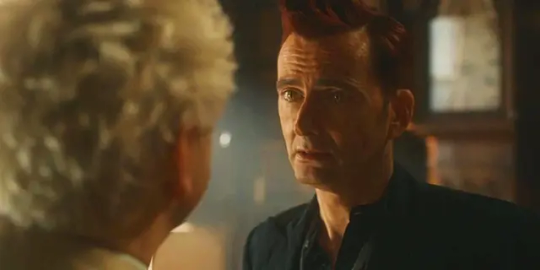
IT’S THE SAME ARGUMENT.
Only Crowley doesn’t let Aziraphale win this time. Aziraphale isn’t right this time. And Crowley isn’t wrong. (I mean I don't think he's right either, they need to find a compromise that isn't the toxicity of heaven and isn't the loneliness of running away.) This time he says, “It’s finally too much, you’re finally asking me to do too much.” Crowley for the first time ever, when asked to make the decision between the two of them, chooses himself. Neither of them explain themselves, and neither of them asks the other to do it either. Because asking questions has always been dangerous for both of them. Anyway, this season makes my brain buzz and I love the ending so much.
#its the “Let me fix it for you” but hearing “Let me fix you for it” dilemma that I said in my Job post#good omens#good omens meta#good omens 2#good omens 2 spoilers#good omens spoilers#go2 spoilers#okay? okay.#but instead its exactly? exactly.#and instead of sweet its actually heartwrenching#I won't stop talking about this EVER
558 notes
·
View notes
Text
god I truly love the red suit (because it's hot obviously and i am not immune), but also because of the glimpse it gives us into stede and where he's at halfway through s2 (thee season of change and growth).
he's been wearing the same shabby, stained white shirt all season so far because he left everything he owned behind, and he hasn't complained once about ed throwing all his favorite clothes overboard, because nothing was more important than finding ed and finally being able to tell him how he felt about him, and I'm so proud of stede for that bit of growth. the white shirt is symbolic of that growth, of his willingness to put ed and the crew first, of him not needing all his physical belongings anymore because he has people to care about now, he doesn't need things.
but he likes them, and the way his whole face lights up when he sees the red suit and he stops to put it on in the middle of a raid (and almost gets stabbed for it) is so stede. he's grown but he still loves his fancy clothes, he loves bright colors and frills and buttons and gold thread. growing doesn't mean he has to stop loving those things, and that's such an important thing for the show to say, especially given where stede is in his journey of self discovery this season. he's still allowing himself to enjoy those things in spite of the undercurrent of fear of not being good enough and self hatred that thrums under the surface since the opening of episode 1 (and eventually leads him to kill a man and get progressively more butch in his outfit choices as the season progresses). i LOVE that he gets to have that, that he gets to feel hot and pose in front of the mirror and strut around all day (and that he gets to be a righteous bitch when the crew destroys the suit).
it's such a realistic representation of someone on a journey of self discovery, of someone who's figuring out what he's worth and why he's loveable and what he likes and will allow himself to like and how he will allow himself to present in front of others. and he gives it away because he loves his little piratical family and wants to keep them happy, but he still got to enjoy that, and he still looked great in just the red shirt with a low neckline and black lace all over it (and he got a "you wear fine things well" for it!!!!!!! ed saw and he understood what it meant to stede and stede got to hear that!!!!!! I'm kissing the show on the lips).
i still feel some type of way about the teal shirt and the leather pants and everything they say about his state of mind throughout episodes 6-8, and i feel fifty more things about him finally being able to have his romantic fantasy come true and know that he's loved in the color that represents repression and being forced to perform a type of masculinity that's been destructive for him his whole life (as I've said before). I think it was insanely symbolic and important for him to be able to wear that particular outfit at that particular time and stay in it for the entire finale.
but. BUT. i can't wait to see what becomes of Stede's gender expression when he has time to rebuild his wardrobe, when he's not running around trying to keep everyone safe or prove he has worth, when he starts to realize and embrace that he doesn't have to be a certain kind of man for people to respect him and for ed to love him. i can't wait to see the choices he makes when he's finally free to choose. I think s3 might kill me yall
#all the talk about positivity got me vomiting my love for the show and my blorbos again#ofmd#stede bonnet#ofmd meta#alex watches ofmd#I LOVE SHOW!!!!!!!
310 notes
·
View notes
Note
Hi, I’ve only read one meta by you yet, but you seem to be just the right person to ask this: did you notice how many people in the scenes outside the bookshop are wearing orange, in series 2?
Any idea what that’s all about? Is it just esthetics, an echo of the bookshop‘s columns, or does it have a filmographical significance? Everytime I watch the show there seem to be more orange clothes, once you start seeing that, it’s crazy how many there are!
Hey thanks for the ask! I mean, you have until 2026 to read more of my drivel so; pace yourself!
Orange clothing is definitely an *interesting* choice for extras in film. You almost never see it in background actors clothing because... it draws the eye! The fact that they included so much orange, yellow, and loud patterning in the extras in season 2 is a real decision to throw film tradition and S1 cannon out the window.
I would like to submit my own theory that the choice was made as a deliberate nod to time travel. But first, a little background.
Compare two crowd scenes on Whickeber street from each season: It's kind of nuts that even at microscopic resolution we get such a HUGE difference.


That's not to say orange is missing. Here are the only two extras wearing orange in S1, and they happen to be in the same scene in episode 2, when Newt and Shadwell meet for the first time, discussing occult beings "hiding in plain sight". (witches in this case)
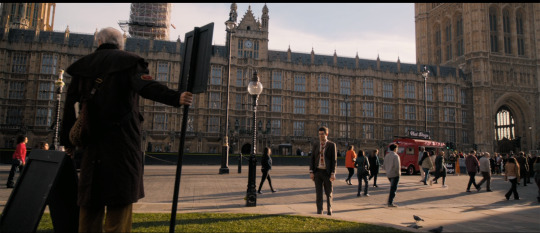
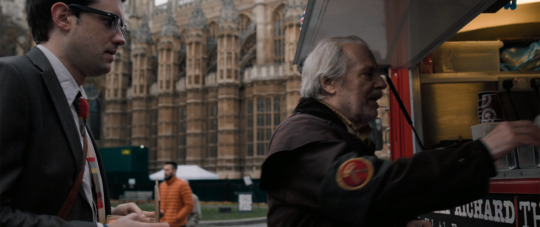
We also get some pretty obvious bright orange in main characters in S1: Madame Tracy and Beelzebub. We meet Tracy in orange as she immediately reveals to Newt multiple hidden identities, see her again wearing orange hair when she communes with spirits, and finally all decked out in orange when she is being possessed by an angel (a person hiding inside a person). Beelzebub wears an orange sash and medal as a high ranking Duke of Hell, so orange is maybe their house colour, or a prestigious colour for hell in general, but after season 2 we know Beelzebub doesn't always have the same face, and is hiding intentions of their own.
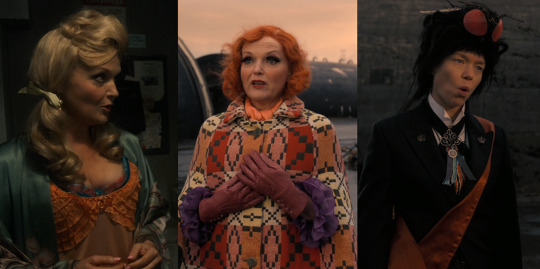
Orange doesn't have much biblical significance, mostly because the colour orange was mostly seen as "fire" or "bright" coloured until way after the bible was transcribed, and orange dye wasn't really a thing in the European world until significant trade with east Asia developed. Here's the only other bright orange thing to appear all season, (in a deleted scene): Crowley hiding in plain sight, posing as a maintenance worker.

I think we might be able to draw the conclusion from season 1 that orange is a colour associated with the "Hidden Occult/Power". Not necessarily only hell, but more as something otherworldly, that's hidden in plain sight. (Interestingly, we never ever see Anathema or Agnes Nutter in orange. So I wouldn't say it's related to witches at all.)
In season 2 however, orange is everywhere. More specifically on extras' clothing and the outside of Maggie's record shop.
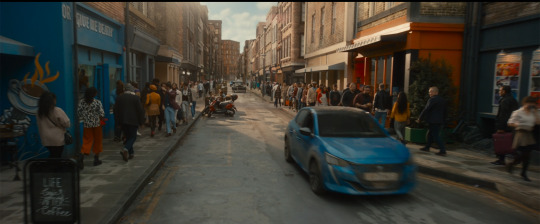
Maggie seems to be the only main character to wear bright orange herself (E2).

But this is by far my favourite one: in the back of the crowd of demons getting a Shax pep talk in S2E5, there's a regular human extra wearing bright orange sitting amongst the army, completely unnoticed by both demons and audience, observing the plan.

This really set off alarm bells for me, because there's a very Terry Pratchett precedent for powerful and unnoticed orange-wearing characters in the discworld series : the time monks.

Terry's character Sweeper seen here on the original cover of Night Watch.
The time monks' clothing and general philosophy is based on Thai buddhist monks, who (like in many buddhists sects) wear donated, saffron-dyed robes in orange and yellow/red to symbolize flames of purity, and to separate them from the world of gross matter, like a fallen leaf from a tree.
In the discworld novel Night Watch, the time monks are responsible for monitoring and cleaning up the timeline, pruning it like a bonzai tree. They are everywhere and yet unnoticed, inside the flow of time yet not of it. And they are the ones who guide the main character through the process of being stuck after falling back through his own timeline, into his own past.
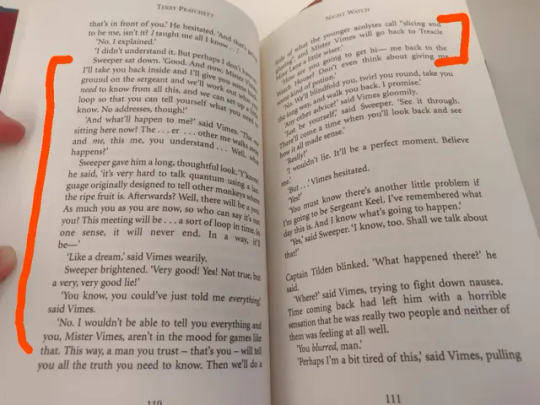
(Excerpt from the book where Sweeper is explaning time travel to Vimes).
Extras circling in the background are called "background actors" because they exist to not be noticed. Put in extras wearing orange/yellow and bright red, and suddenly you can track them, and notice how they are part of the crowd, but stand apart from it. You can notice when they go missing from one cut to the next, or appear to circle or jump between frames.
Many extras, including the demon army watcher, also seem to be circling, and monitoring the goings-on in the world of Good Omens. Based on the meaning of orange from S1, it would seem these mere background actors are more than they appear to be. Could they even be checking up on unwarranted time distortions or timeline ruptures happening around a certain Bookshop...?
#good omens 2#art director talks good omens#good omens meta#go season 2#go meta#good omens season 2#good omens season two#good omens#go2#good omens analysis#good omens s2#good omens theory
93 notes
·
View notes
Text
When a Steard is not a Beard
I want to talk about the significance of Stede's beard in the opening dream sequence of s2e1, and how we know from Lucius in the first season that "not every beard is a beard". Of course SOME beards are just beards - most of the Revenge and QA crew sport face fuzz of some sort or another, and it's just How They Look. But, narratively speaking, when attention is called to facial hair in this show, it's all about deception and hiding one's true self.
We have Blackbeard, who has built his brand around his eponymous facial fur, but feels stifled by the way the success of said brand has left him bored out of his skull, and frustrated by the way his reputation has been co-opted and twisted into something inhuman. (And by poor Taika's accounts, the beard itself was literally stifling; unbearably hot to wear, and how he could hardly move the bottom half of his face lest the glue start peeling off). It's only when Ed shaves it off at the academy that he's able to start really approaching the question of what it means to be Just Ed. And, of course, we have the way he smeared kohl across his mouth and jaw in a frightful simulacrum of a beard as part of his Kraken transformation at the end of season 1.
We have Jim, who uses a fake beard to conceal their identity while on the run after having killed Alfeo de la Vaca. Only once that beard is discarded are they able to really think about who they are and how that doesn't fit in the narrow parameters of a gender binary. We see them go back into the beard when they re-commit themself to the vengeance quest, posing as a bearded priest in order to capture Geraldo, but, again divested of the beard, Jim is able to consider whether completing the vengeance quest and allowing their life to be consumed with a family that is dead and gone is something they want, or if they might be happier committing themself to a different path, and finding a family that will give them the love and support their own no longer can. And then, of course, the way Jim paints on a simulacrum beard when they are forced into a life of violence as part of Kraken!Ed’s crew.
We have Heartbroken Voyeur Stede’s comment about how Calico Jack had nice hair, but “his moustache is weird.” Shortly after, we learn that CJ has been a duplicitous, manipulative asshole the entire time, his only goal to lure Ed away from the Revenge before the British came to kill Stede.
So what does it say that Stede is dreaming about himself with a full beard? To have Dream!Ed specifically comment on it? Because they’re calling attention to it, so, hey, hi, how are you? You have my attention!
I think it’s not JUST that Stede is casting himself in the role of the dashing hero with all the trappings thereof, indulging in a fantasy about a joyous, romantic reunion with his beloved. Because this fantasy has some MUCH darker connotations than the sun-drenched beach would suggest. This Dashing Hero™ persona isn’t Stede’s idealized self. It’s the culmination of all his insecurities about not being the kind of person who is worthy of the attention and love of someone as impossibly cool as Blackbeard.
(Incidentally, I think it significant that Ed, in the dream, ALSO has his full beard. This more than anything is what clues me into the fact that Stede is still trying to measure up to the Legendary Pirate Blackbeard - not Just Ed with his soft, beautiful clean-shaven face, nor even a more realistic version with a beard that’s coming in quite nicely, but isn’t anywhere near the epic proportions that it once was, as we see with the scenes of real Kraken!Ed)
We learn later in the episode that Stede has been dragging his feet about setting out to reunite with Ed in spite of the all the money he and the crew have managed to scrape together working for Jackie, and the true reason behind his reticence is that he is still genuinely convinced that Ed is better off and happier without him. Even when reunited with Lucius in episode 2 and Lucius suggests that Ed’s time with Stede was “as good as it’s going to get for [Ed]”, Stede’s response is that he’s “not ready to believe that.” Stede really just is incapable of conceptualizing a reality in which Just Stede could ever be enough.
(And don’t get me started on Lucius’ beard! Lucius who was the emotional intelligence of the crew in the first season, and is now a guarded, brittle, traumatized shell of who he was. He’s 100% for sure not hiding behind a façade of butched-up toughness. Nope. Not. At. All.)
So in Stede's dreams, he’s the epitome of the kind of guy that WOULD be good enough. The kind of guy who has a beard and wears leather pants (hello queer urge to become the person that you sexually desire, how are you?). The kind of guy with neat, tidy, barely even wavy hair instead of perfectly coifed cherub curls. The kind of guy who, if he wears a fine fabric at all, it’s wrapped around his waist where it can be mostly concealed by a thick, macho belt, and trailing in front of his crotch like a fabric phallus (and, say, if Ed feels like touching it, maybe there’s something else in the vicinity that he might also be interested in touching?). The kind of guy who is tough and competent and can kill without remorse or pity.
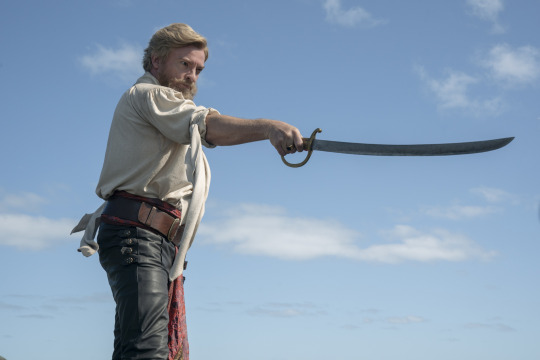
243 notes
·
View notes
Text
Man, on Book 2 already, and Azula's introduction as a character and villain is amazing.
The first time we see her is in a flashback on episode 12 of Book 1, in Zuko and Ozai's Agni Kai, and everyone's reaction is like “hold on who's that girl?”
Then, Zuko reveals he has a sister that his father favors over him in the Book 1 finale, and then right the last scene of the season is us fully seeing Azula for the first time as we're being told she's going to be the new villain in Book 2, like Zhao or Zuko were in Book 1, but no. The moment we see her talk for the first time in The Avatar State you realize that she is scarier than Zhao was, and then the first time we see her bend, she is bending fucking lightning. She fights Zuko without even bending that episode—she only bends at the end, once to get space and then she starts generating lightning again—and is only taken out temporarily because Iroh intervened and immediately took Zuko and ran because he knows she's actually a threat.
Even when she meets with Aang for the first time in Omashu and then in episode 8, we immediately see that Aang realizes that Azula is not Zuko and she is definitely not Zhao. At the end of the day, they weren't that much of a threat. But Azula immediately proves smarter, more calculating and more level headed-- and she's also definitely stronger than both of them. It's easy to realize that Azula and her team pose the first real threat to Aang and his friends, and the way it's exposed is great.
404 notes
·
View notes
Text
If I Were You (Yandere!Austin!Elvis x Reader)
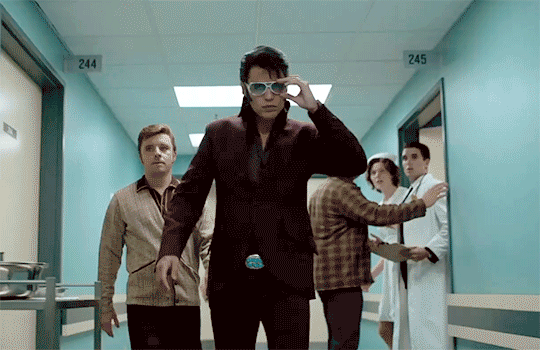
Summary: Elvis takes up Priscilla’s offer to go to rehab for Lisa, and decides to take the steps to break from the Colonel personally and professionally. Elvis is referred to you, a Memphis-based therapist who specializes in helping patients work through codependent or otherwise unhealthy relationships. While he ultimately hopes his turning his life around will give him a better chance of reconciliation with Priscilla, the level of emotional intimacy you allow him in the context of your sessions makes him redirect his attention to you.
Note: This is based on an anonymous request. Reader is a cis woman, but no other descriptors are used. I appreciated having an excuse to rewatch some of my favorite Sopranos episodes because I got a lot of inspiration from seasons 1 and 5. It’s more dialogue heavy than my other fics because of the therapy sessions. I’m not a psychiatrist and nothing in this fic should be treated as legitimate advice regarding mental health, please refer to licensed professionals for that. Look at the warnings before deciding whether or not you want to read this fic because it’s extremely dark. Do not interact with my blog or my posts if you are under 18 or post ED/thinpso content.
Word count: 6.5k
Warnings: This is a yandere fic, so expect dark themes such as emotional blackmail, obsessive and manipulative behavior, and abuse of power, which some people may find disturbing or triggering. The therapy session scenes involve discussions of codependency in relation to parenting and relationships as well as self-blame, death, and drug and alcohol abuse. Explicit sexual content which involves force and coercion and brief daddy kink. Elvis’ mommy issues. Do not interact if you are under 18.
Part 2 | Part 3 | Part 4 (all other parts by @crash-and-cure)
When you received a phone call from Dr. Wilson, one of your colleagues who worked at a rehabilitation facility in San Diego, asking if you were taking new patients, you hadn’t thought much of it when you answered that you were. He elaborated that while the patient was doing well in rehab, he thought he could benefit from continued therapy sessions, particularly because of your specialization and proximity to the patient’s home in Memphis. He informed you that he’d reveal more information about the patient and provide you with the clinical notes he’d taken throughout rehab once he received the patient’s agreement and approval to begin seeing you.
A few days later, you got the follow up call. The patient was interested in being treated by you and had given Dr. Wilson permission to send you copies of the clinical notes. He finally revealed who your Memphis-based patient would be—Elvis Presley. You nearly dropped the phone when he told you. Him going to rehab made sense, his drug and alcohol-fueled antics on stage frequently made entertainment headlines, but you certainly hadn’t expected that he’d need the specialized therapy that you offered.
Elvis still had two weeks left in the rehabilitation program, and you’d receive the clinical notes before then to get an idea of what Dr. Wilson had already addressed with him. When you received the packet at your office’s mailbox, marked with a large ‘CONFIDENTIAL’ stamp on it, you almost hesitated. While aware of his career, you weren’t a huge fan of Elvis’, so that wouldn’t pose a conflict of interest, but you wondered if you could truly be impartial and fair toward a man whose existence permeated almost every aspect of American popular culture.
From what Dr. Wilson had said, Elvis needed help, not as a rockstar but as a man. You were one of less than forty therapists in the country who specialized in helping patients break down codependent relationships. Your office wasn’t far from Graceland at all, ensuring Elvis wouldn’t have to go out of his way for regular therapy sessions.
Finally opening the packet, you were faced with a manila file folder with Elvis’ full name and birthdate printed on the tab. You grabbed your notebook, preparing to write what was relevant for the sessions, but the more you read, it seemed like everything was relevant. A deceased overbearing mother whom Elvis revered as a saint, a manager who exploited his career for decades, and an ex-wife who was burdened with being the man’s stand-in mother and therapist from an alarmingly young age.
You sat back in your chair, exhaling deeply to ground yourself. Taking on Elvis Presley as a client would not be easy, that much was obvious. Most of your clients didn’t have webs as intricately woven as he did, as much to unpack and consider as Elvis. Yet, from the notes, he wanted help. He wanted to change. He didn’t want his daughter Lisa to grow up without a father, but he also wanted a career and a life that he could finally be in control of, where he could be sure of who to trust.
On a Friday afternoon, when you were in between appointments, your phone rang. You answered, resisting the urge to gasp when you heard who was on the other line, despite expecting his call.
“Hello, is Dr. Y/L/N there?” Elvis asked.
“Speaking,” you answered.
“Oh.” He sounded surprised. “Dr. Wilson didn’t mention you were a woman.”
“Is that a problem, Mr. Presley? Because I can refer you to another specialist—“
“No, that’s fine. I just thought you were a secretary or somethin’—no offense.”
“None taken,” you said.
The two of you discussed what his goals for therapy were, and that he wanted to attend twice a week, which was how often he was seeing Dr. Wilson while he was in rehab. Many people were hesitant about therapy since it had an unwarranted stigma attached to it, but you supposed the group therapy and personal sessions in San Diego had proved its effectiveness to him. You agreed to schedule appointments for Monday and Thursday afternoons at 4:30pm and leave the service door to the building unlocked for him, so he could come in at the end of the work day and not have to worry about passersby and other patients seeing him there and causing unwanted attention.
The conversation was short yet pleasant, but if you were being honest, you hadn’t been so nervous about taking on a patient since you first opened your own practice. You had tried to reason with yourself, that he was just a man seeking help like all of your other patients. None of your other patients, however, were Elvis Presley. You managed to calm yourself down the day of his first session, focusing on the other patients you had scheduled.
He arrived fifteen minutes early the day of his first appointment, a non-issue as you had made sure the session before his was wrapped up by four, giving him a window of time to arrive while the office was empty. You took a deep breath before opening the door to the waiting room from your office, and found him staring at a painting on the wall. He turned to you, giving you one of the most dazzling smiles you’d ever seen in your life.
You greeted him with a friendly smile and an outstretched hand. “Good afternoon, Mr. Presley, it’s nice to meet you.”
“Same here, Dr. Y/L/N,” he said, shaking your hand.
“Follow me, and take a seat anywhere you like,” you said, leading him into your office and closing the door behind you.
“Is this some kinda test? You can tell something ‘bout me by which one I pick?” he asked half-jokingly.
You laughed. “No, no, it’s just that we’re going to be sitting for an hour, so I want you to be comfortable.”
He sat in the armchair in front of the bookcase, rather than the one in front of your desk. You grabbed your notebook and sat down across from him. The two chairs were nearly identical anyway, so it didn’t make that big of a difference where either of you sat. Taking a moment to study him, you couldn’t help but acknowledge to yourself how good he looked. You always thought Elvis was a handsome man, but post-rehab, he seemed to be glowing in a way that seemed almost youthful. After allowing yourself to ogle your new patient, you cleared your throat.
“Now, before we begin our first session, I want to establish doctor-patient confidentiality and inform you of your rights as a patient. Is that okay?” you asked.
“Sounds good to me,” he said.
“Wonderful. I take doctor-patient confidentiality seriously. Anything you say in this room will stay in this room. However, if at any point during our sessions you indicate that you intend to seriously harm yourself or others, I would have to go to the police.”
“Seriously harm?”
“Any intentional action that would result in the hospitalization or death of yourself or another individual,” you elaborated, and he gave you a silent nod to continue. “I may encourage you to dig deeper into your psychological and emotional state, you don’t have to answer any questions that you don’t want to, but keep in mind that I’m trying to guide the conversation in a direction that will help you achieve the breakthroughs you want.”
“You know, my mama used to call you psychologists ‘headshrinkers’. Hell, I even do sometimes,” he said with a laugh.
You smiled at the comment, it certainly wasn’t uncommon for people to be skeptical of mental healthcare, but since he’d already brought up his mother, you didn’t want to lose that momentum.
“I completely understand. When I told my parents I was getting my doctorate in psychology, I might as well have told them that I was going to clown school,” you said. “Some people turn to religion for their psychological guidance. My parents are like that. Were yours?”
“Oh yeah, mama was always quotin’ scripture.”
“And your father?”
“He went to church with us sometimes, but it was usually me and mama. I stopped goin’ to church once my career started takin’ off. Didn’t have the time to, but I still love those old gospel hymns.”
You nodded, taking quick notes as he spoke.
“You writin’ that I’m some religious nut in there?”
“No, just general observations, things you’ve mentioned that have appeared while treating other patients. The more I treat people who’ve struggled with codependency, the more I can help others by recognizing patterns of behavior,” you explained. “I read from your file, which thank you for letting me look at by the way, that you experienced this codependent abuse from your former manager, Tom Parker.”
He exhaled, and you made note of his utilizing the coping method to calm himself down.
“The Colonel thought he was entitled to half of everything I made, even though I was the one workin’ myself sick. He had that hack doctor put all kinds of junk in me to keep me movin’ like some walkin’ dead man. That cost me my family and half of everything I ever earned. I’m suin’ the son of a bitch, but I can’t let this happen again.”
“Elvis, I’m sorry that happened to you. You were taken advantage of by someone you trusted. You have every right to be upset and angry. I encourage you to express those emotions while we're here,” you said. “I want to challenge you to stop referring to your former manager as ‘The Colonel’. I think that language is detrimental to your progress as it sets him in a place of authority over you, when in reality, he isn’t and never was.”
He scoffed. “What should I call him then? ‘That piece of shit’?”
You couldn’t help but laugh. “If you’d like, yes.”
For the rest of the hour, he spoke about his former manager, and while you had an idea of what went on from the notes your colleague had given you, the extent was just as bad as you’d expected. As a doctor, you were particularly horrified by the so-called ‘Dr. Nick’ who exacerbated Elvis’ addiction to prescription medications in the name of the almighty dollar. Elvis peppered in mentions of his mother throughout the session as well, and you made a note to dig into that in the future. You weren’t the biggest proponent of Freud, but you knew many people went through life subconsciously mirroring the behavior of their parents unless they made a conscious decision not to.
At the end of the session, you let Elvis know that you admired the progress he’d made so far, both in rehab and his first session with you. He smiled at that, and confessed that even though he wasn’t sure about seeing a woman therapist, as soon as he saw you, he knew there was something different about you, and he already felt comfortable around you. You stayed in your office late to work on the notes for his file while they were still fresh in your mind, and left around a quarter to seven.
The Monday and Thursday sessions continued consistently for the next few weeks, and you were thrilled with how much progress Elvis had made, both in therapy and in his personal life. He was more involved in Lisa Marie’s life and had her over at Graceland regularly, making sure his days were completely clear whenever she was over so he could focus on spending time with her. His sleep pattern had become more regular, with some bouts of understandable insomnia. You and Dr. Wilson had already agreed that with Elvis’ history of addiction, holistic approaches to any psychological conditions would be best, and prescriptions would only be given as an absolute last resort. When he told you that he felt better than he had in years, physically and emotionally, you considered it a huge success, and encouraged him to acknowledge and celebrate that.
Understandably, most of your sessions with Elvis were spent discussing his former manager and the influence and control that he had on Elvis’ career and personal life, particularly the strain it caused on his mother. That was a sensitive issue for him, and he tended to deflect when you tried to bring her up or discuss his relationship with her further. About four months into your treating him, however, he mentioned feeling some resentment toward his father for mismanaging Elvis’ finances, making an off-handed comment about how it wouldn’t have happened if his mother were still alive. You saw this as the opportunity to get him to finally elaborate.
“Your mother was the dominating figure in the family unit, then?” you pressed.
“Mama was a good woman, the best woman. She put food on the table when daddy was in jail. She believed in me before anyone else did.”
“I never said your mother wasn’t a good woman,” you observed. “Why did you jump to that conclusion, that I was attacking her?”
The room was silent for a few moments as he considered your question. “Everyone else did. You know, she was right about not trustin’ the Col–Parker. It’s like when I signed that contract with him I was signin’ her death sentence.”
“Do you blame yourself for her death?”
“I know it was the alcohol. I learned that much in rehab, but in her heart, it was me. She died while I was in basic training, doctor.”
“I’m glad you’re talking through this. It’s going to help with our future sessions, but I want to establish that you’re not responsible for your mother's death anymore than you’re responsible for her other actions throughout her life.”
He shook his head. “Me leavin’, that killed her.”
“Why would your leaving kill her? As I understand, you were drafted. You didn’t have a choice.”
“Because I was supposed to take care of her. My daddy wouldn't, so I did.”
“Do you think it’s right for a child to take care of their parents?” you asked.
“It’s not about what was right,” he argued. “I had to do it.”
“How old were you, when you first stepped into this pseudo-parental role?”
“What?”
“How old were you when you began taking up the household responsibilities that belonged to your father?”
“I was real young, when he went to jail and we had to move. I had a good childhood, though. We didn’t have much, but I had friends and I went to church, did alright in school.”
The hour was almost up, but you knew you were close to reaching a pivotal point in his treatment. As soon as you got him to consider that his codependency issues started with his mother, you could work through his relationships with Tom Parker and even Priscilla, but it’d be easier said than done to drag his mother off of the pedestal he put her on. She’d been dead for over a decade, and yet she still had a spectral stranglehold on her son.
Your intention wasn’t for him to walk out of your office hating his mother, but to recognize the unhealthy behaviors he emulated and to work through the grief he clearly never fully dealt with.
You figured you had time to ask him one more question, and chanced it with, “What do you miss most about your mother?”
“I could tell her anything, and she’d always have something to say. Maybe not what I wanted to hear, but she always meant what she said. I trusted her like no one else. I don’t know if I ever will.”
“It’s hard for you to trust people, with the position that you’re in and how people have taken advantage of you in the past. That can be lonely, and some people engage in self-destructive behavior in an attempt to get the care and attention they yearn for. I believe that you will be able to trust again. Just something to think about as the session ends today,” you said. “You’ve made a lot of progress, and I want to acknowledge that.”
He smiled. “Thank you. You really know your stuff, but I guess that’s what you went to school for.”
“I appreciate that,” you acknowledged. “I hope you have a great rest of your day, Elvis, and I’ll see you at our appointment next week.”
After Elvis left, you worked on your notes from the session to add to his file. You weren’t just paying him lip service before, he had made a good amount of progress, and even despite some of his hesitations, worked through some aspects of the treatment that you expected to be more challenging for him.
The next few sessions, you pressed him more about his mother, and while he pushed back against your insinuating that some of his codependent tendencies originated with her, he did acknowledge that the pressure of not upsetting her did cost him his participation in his high school’s football team, which he loved for the brief amount of time he spent playing. She had been worried about him getting hurt, a pattern you noticed as Elvis spoke to you about his childhood.
You weren’t expecting to find that the root of her anxiety over Elvis’ well-being came from losing his twin, Jesse at birth. Elvis was born into the world having to be two men instead of one, and when his father fell through as the family’s provider, he had to pick up the slack for three. It was a lot for someone to handle even without the challenges of fame. The more you worked with Elvis, the more convinced you became that he could have benefitted from therapy a decade sooner.
In all honesty, you were glad Elvis’ appointments were at the end of the day, because they began to become almost as draining for you as you figured they were for him. Still, he never missed an appointment and always arrived early. The work you did was always difficult, and you couldn’t help but empathize with your patients, but Elvis seemed to take everything out of you.
One weekend, you had plans to get dinner with Mark, a man around your age who you’d met in grad school and had an on-and-off again relationship for a while, before deciding to stay friends. Out of habit you both referred to whenever you’d get together as ‘dates’, and the one you planned was at a higher end restaurant in Memphis. The two of you had been so busy with work that when he called you to catch up, you hadn’t realized it’d been months since you’d seen him. The restaurant was the type of place where you had to make reservations in advance, and so with this in mind, he made one a few weeks prior.
When you and Mark arrived at the restaurant, there was a crowd of loud and restless people overflowing into the street. The two of you pushed your way through to get inside and waited to speak to the host, who informed you that due to unforeseen circumstances, there’d be a thirty minute wait for your table despite your reservation.
The two of you considered leaving and going to a different restaurant, but decided against it, since you had the reservation anyway. To your relief, the wait only ended up being less than five minutes, even though you could tell by the reservation list on the host’s podium that several couples were still ahead of you and Mark.
A waiter led you to your table, and after taking your dinner orders, Mark excused himself to go to the restroom. While waiting for him to return, you could hear people gasp and murmur behind you, until a familiar shadow fell over your table.
“Dr. Y/L/N, funny meeting you here,” Elvis said.
You raised your eyebrows, not expecting to see your high-profile patient of all people in the restaurant. “Mr. Presley, how are you?”
“I’m doin’ just fine.”
“That’s good to hear. I’m glad.”
“Are you here alone?”
“No, my date is just in the restroom.”
His expression shifted, but he nodded agreeably. “Well, have a good night.”
“You too,” you whispered as he walked away.
Fuck. He was upset you were there with someone. It wasn’t uncommon for your patients to temporarily redirect their codependent tendencies onto you, considering the level of emotional intimacy that was involved with the therapy. It’d only once escalated to a level where you felt obligated to refer the patient to another therapist, but you hoped that wouldn’t be the case with Elvis. He’d been making great progress with each session.
When Mark had returned to the table, you gave him a strained smile but continued on with the date as usual. About halfway into your meal, the waiter approached with a bottle of wine neither of you had ordered.
Before you could question anything, the waiter said, “Compliments of Mr. Presley.”
“As in Elvis Presley?” Mark asked.
The waiter nodded and set the bottle on the table. You weakly told him to thank Elvis, and he left to do so. As soon as he was out of earshot, Mark leaned in, “Is Elvis Presley your patient?”
“I won’t answer that, Mark.”
“Holy shit,” he said, opening the bottle of wine.
You didn’t recognize the label from the wine rack at the supermarket and figured it was some expensive brand that was either old or imported, or both. As Mark poured himself a glass, you contemplated whether or not to drink it. Refusing so would confirm that Elvis was your patient, but drinking it would mean you accepted a gift from a patient, both situations required you violating your own code of ethics. Sighing, you let Mark fill your own glass with the wine.
The rest of the night with Mark was fun as you caught up on your personal lives, and Elvis didn’t make a reappearance at all. When Mark walked you back to your car, the two of you promised not to go as long without seeing each other again, and parted with a quick kiss.
You spent Sunday lazily reading in the comfort of your apartment, adjusting the radio in your living room to different stations every so often. All of them seemed to play at least one of Elvis’ songs at some point, and you wondered if you were only noticing the frequency he was on the radio now that he was your patient. Some artists were just radio mainstays, and he was one of them.
On Monday, you knew you’d have to address the situation with the wine to Elvis, but to your surprise, he beat you to it.
“So, how was the wine?” Elvis asked.
“It was kind of you to go out of your way to have something so nice brought to my table, but I can’t accept gifts from patients,” you said. “I hope you understand.”
He narrowed his eyes, leaning over so his elbows were resting on his knees as he asked, “That guy you were out with, he your husband?”
“No, just a friend.”
“You married?”
“No, but–”
“You ever been married?”
“No,” you repeated, “but while we’re on the subject, let’s discuss your marriage and Priscilla.”
You noticed him hesitate to answer. “Is that okay?”
“Sure,” he said.
“How did you meet Priscilla?”
“Her daddy and me were both stationed in Germany at the same time. I met her when she came to a party at my house one night.”
“What attracted you to her?”
“She wasn’t like anyone else I’d ever met in my life. She was beautiful and sweet. I just knew there was somethin’ different about her,” he said, quickly adding. “I was respectful, ya know. She put up with a lot from me, but she was there when I needed someone.”
“You mentioned in a previous session that your mother died while you were in basic training, and after the funeral you were sent to Germany, where you met Priscilla. Do you think you incorporated her into your grieving process?”
He shrugged. “I don’t know. Maybe.”
You kept pressing him for more details, knowing it wasn’t a coincidence that he happened to meet the woman he’d go on to marry after such a devastating loss. The more he elaborated on his relationship, the more you came to understand the codependent nature of it as well. Priscilla became a stand-in for his mother despite her youth, and he began to depend on her the same way. You found it particularly interesting that he encouraged her to dye her hair and gave her the same nickname he had given his mother.
“I understand you and your ex-wife are still close, and she’s part of the reason you’re here. Can I ask you, when you and Priscilla divorced, what you were feeling?” you asked.
“I–I’m sorry, can we talk about something else?”
You nodded, making a note to revisit that later. For the rest of that session and Thursday’s session, the two of you spoke mundanely about how his day to day life was going, the strides he was making to live a more sustainable lifestyle. He informed you that he wanted to make music and perform again, but wouldn’t tour while his lawsuit with Tom Parker was ongoing. Even then, he planned to take it slow, scheduling dates more spaced out to give himself time to rest. He did mention trying to work something out with his team to do one-off performances in the Memphis area in the meantime, to figure out how this new era of his career would go.
The following afternoon, when you usually had an hour or so break between sessions to have lunch, you were interrupted by repeated knocking at your office door. You opened it to find a gift basket on the ground, looking back and forth in the hallway to see if the person who left it was still there, you picked it up and brought it over to your desk. The basket was filled with an assortment of goods that you knew must have been expensive from the brand names that you actually did recognize, and all of the gifts were perfectly suited to your taste. For a moment, you thought it was Mark’s doing, but when you read the attached card, you sighed.
Early on in your career, you had made it a rule to not accept gifts or favors from patients. It helped establish to your patients that you were their doctor, not their friend, as much as you did care for them. You took your ethical responsibility as a therapist seriously, and so you contacted the company where the gift basket had come from, informing them that you’d like them to pick it up and inform the sender that you couldn’t accept it. You’d been expecting the phone call you received about an hour later.
“I tried to get what I thought you’d like,” Elvis said. “Guess I don’t know you as well as I thought.”
“Mr. Presley, I told you in our last session that I don’t accept gifts from patients. I appreciate the gesture, it was extremely thoughtful, but it violates my personal ethics.”
“You drank the wine I sent over to your table,” he argued.
You pursed your lips. You knew letting Mark accept it was a mistake. “That was a completely different scenario. If I had publicly refused, it would have confirmed to my date that you were my patient. I made the decision to respect your privacy.”
From the way he huffed over the phone, he was frustrated. He always did so in sessions when you pressed him to dig deeper into the aspects of the major relationships in his life that he didn’t want to confront. “I understand, doctor. I just wanted to show my appreciation for you, is all. I’ll see you on Monday.”
“Have a good night, Mr. Presley. See you on Monday,” you said.
The next few months went on without incident, and you were pleased with the progress you were making with Elvis. He was willing to open up to you much more, and you found yourself revealing some information about yourself to him as well. Sometimes, it unnerved you how he seemed to remember things you had mentioned in passing weeks or even months before, as if he were taking his own notes on you.
Once in a while, you’d run into him while you were running errands and minding your business in Memphis, having quick and cordial conversations before going your separate ways. Part of you suspected it was deliberate, as a man as famous as him knew he couldn’t step foot anywhere outside of his home without making the news.
On a Friday evening, as you led your last client of the day out of your office, a man you didn’t recognize was standing in the waiting room, looking around at the decor in your office. When you walked out, he looked at you as if he’d seen a ghost.
Before you could speak, he said, “You look really familiar.”
“I don’t know how that could be. I don’t believe we’ve met before,” you said. “I’m Dr. Y/L/N.”
He hesitated before answering. “I must be seeing things, then. I’m Jerry.”
“Nice to meet you, Jerry. May I ask what brings you to my office?”
“Elvis sent me. He’s doing his first show in over a year next weekend, and he wanted me to bring you this VIP pass. Soundcheck, front row seat, backstage access, the works,” he said, holding out the small plastic card to you. “It’s in town, so he’ll send a car for you.”
You shook your head, feeling like a broken record when you declined. “I appreciate the gesture, but I don’t accept gifts from patients. Please send my regards and tell him thank you anyway.”
Jerry nodded. “Alright, nice to meet you, Doc.”
As soon as he left, you collapsed onto the couch. You were making great progress with Elvis, serious progress, but it was clear that he was shifting his codependent tendencies onto you. As much as you didn’t want to, you had to consider referring him to another therapist. It’d be a hassle for him, as the closest therapist with the same specialization as you was located in Nashville. It wasn’t uncommon for your patients to exhibit similar behavior toward you, especially early on in their treatment, but you’d been working with Elvis for nearing a year. You decided to give him the benefit of the doubt, as his case was far more complex than any of your other clients, past or present.
While you were in the supermarket checkout later that evening, you glanced at the tabloid magazines that were displayed next to you, and your eyes nearly bulged out of your head when you saw the cover of most of them–various photos of Elvis, out and about in Memphis with different women who all looked almost exactly like you. Suddenly, you felt as though everyone in the store was staring at you, and you abandoned your cart, rushing out of the store and to your car where you had your first panic attack in years.
As you cried into the steering wheel, attempting to catch your breath, your mind raced at the implications of what you just saw. The women were stand-ins for you, but they weren’t enough for him, they never would be. You knew that if you continued to spurn his advances, they’d only become more elaborate and unavoidable, and by giving him some of the attention he desired, you’d only be encouraging his unhealthy behavior. Your next session with Elvis was that upcoming Monday, and you’d make sure to let him know about your colleague in Nashville and cut all ties with the rockstar.
By the time Monday morning rolled around, you wanted to cancel all of your other appointments for the day, but your other patients didn’t deserve to have their treatment interrupted because of one patient. The day flew by, to your dismay, and 4:30 arrived far sooner than you were ready when he walked through the door and into your office. He sat down in his usual seat, and you resisted the urge to glare at him. You didn’t appreciate being manipulated for personal gain, and you figured he of all people would have understood that.
“Mr. Presley,” you began sternly. “I have repeatedly tried to enforce the professional nature of our relationship as doctor and patient, and yet you insist on sabotaging the massive strides you’ve made in your treatment by repeatedly making attempts to violate that. I think that continuing to see me as a therapist would be detrimental to your recovery, so I’m referring you to a colleague of mine with a similar specialization. After this session, I will no longer be your therapist.”
He stared at you incredulously before becoming stone-faced. “Well, since you won’t be my therapist anymore, I guess you can accept all those gifts now.”
Your mouth nearly fell open at his boldness. “Mr. Presley, you’re missing the point entirely.”
“No, I think I get the point loud and clear, Y/N.”
Your chest contracted as his use of your first name. “Mr. Presley, I’m going to have to ask you to leave. Now.”
He stood up from his chair, and instead of walking out the door, crossed the few feet of space between you and caged you into your chair. He stared down at you intensely, silently, for what felt like hours. Too frightened to move, you held his gaze until he cupped your chin in his hand, gently rubbing his thumb against your skin.
“You’re doin’ this for us, mama,” he whispered, “so we can be together.”
“I’m doing this for my own safety.”
“I knew you felt the same way about me, how much you wanted me too.”
“Elvis, please, let’s just sit back and discuss this. I won’t refer you to another therapist,” you lied, trying to appeal to whatever sense of rationality he may have had.
His other hand drifted to your thigh, inching its way up your skirt. Feeling a rush of adrenaline, you pushed him off of you and hoped that it would disorient him enough for you to run out the door. Instead, he beat you to it, pressing you against the wooden door that stood between your freedom and captivity.
“C’mon, mama, we’ve had this date since the beginning,” he purred in your ear.
Perhaps you had been too preoccupied with having Elvis Presley as a professional success story than acknowledging the delusional and obsessive tendencies he displayed. Where did you go wrong? You tried to think back through a year’s worth of therapy sessions to figure out when exactly you’d given Elvis the impression that you were interested in him romantically or sexually, but were torn from your thoughts when he kissed you aggressively. He must have mistaken your attempts at protests for moans, because he only deepened the kiss, biting your bottom lip so you’d gasp in pain, giving his tongue access to your mouth.
You put your hands on his shoulders to steady yourself and tried once again to push away, but he was too strong–and determined as he backed you into your desk, the impact from both of your bodies bumping against it sending some of the items to the floor.
“Elvis, you don’t have to do this,” you pleaded. Why were you still coddling him?
“You want this, mama,” he groaned, grinding his clothed erection against your exposed leg like a dog in heat. “I know you do.”
He didn’t give you an opportunity to argue, bringing his lips to yours again and hastily unbuttoning your blouse. He rid you of your bra just as quickly, and took one of your breasts in his mouth. Guiding one of your hands to his crotch, he rubbed your hand against it, and you let out an involuntary whimper as his moans vibrated against your sensitive nipple.
Thrusting against your hand, he pulled away from your breast, muttering something about cumming in his pants if he didn’t do anything about it soon. He shed his shirt, throwing it aside. The reality of the situation hit you as he lifted you back on top of the desk and pulled down your panties. He dragged his ring finger up your slit, and you shivered at the sensation of the cold metal of his rings against it. Apparently satisfied with how wet you were, he wasted no time unzipping his pants and ridding himself of them to reveal he hadn’t been wearing any underwear. You stared wide-eyed at his cock, as he stroked it before positioning it at your weeping cunt.
“Just take it, mama. Be real good for me and take it like I know you can,” he cooed in an attempt to placate you as he slid himself into you.
You choked on air at the sensation, not expecting how big he’d be, and tears began to run down your face. He kissed them away as he thrust into you, whispering about how good you were being, how perfect you were. Two of his fingers played with your clit, and your felt your vision go hazy at the pleasure that was building up in your core. You’d never felt that good in your life. Maybe you did want it after all.
“Fuck, daddy,” you moaned, nearly throwing your hands over your mouth at the realization of what you had said.
That seemed to stir something in him, because his thrusts became harsher and more erratic while you berated yourself for actually enjoying it. The moans that came from your throat sounded almost foreign to you.
“You got no idea how often I thought about this, mama,” he managed to groan. “Come for daddy.”
With a grotesque cry, you came, feeling yourself clench around him as he kept up his ruthless pace. His own orgasm followed soon after yours, and as you felt him cum inside you, you weren’t sure whether you hated him or yourself more. What felt like hours passed before he finally pulled out from you, leaving your inner thighs wet with cum and lightly bruised.
You looked at him through your tears, knowing your mascara was surely tracked down your face. He reached for you, and you flinched back, nearly falling off of your desk until he steadied you, and you broke down into humiliating sobs into his shoulder, your nails purposely digging into his skin. You wanted to hurt him, somehow, make him feel how you felt. Instead, he seemed unfazed, releasing you from his grip when your crying had settled down to hold your face in his hands.
He looked into your eyes with all of the delusional affection you’d feared and whispered, “You’re my girl, my bestest girl.”
#elvis x reader#austin!elvis x reader#elvis presley x reader#yandere!elvis x reader#yandere x reader#elvis#elvis 2022#austin!elvis#yandere elvis
2K notes
·
View notes
Text
(This leads on from this post, which focuses on clothing and disguise in OFMD Season 1. I'm going to do a separate post on Ed's clothing change, and how this all culminates at "Calypso's Birthday," to avoid this getting too long and unwieldy for Tumblr.)
At the start of Season 2, Stede has abandoned most of his finery by necessity. He opens the season in a dirty shirt and trousers, a costume that he comes back to several times even after he returns to the Revenge. He's given up his wealth, and all of the money they earn at Jackie'z goes into the coffer to help them go back to sea.

Even this early, Stede's costuming is significant. He's not just dropped the finery that had defined, and after a while imprisoned, him, he's done it by choice. He gives up his wealth so that his family can be secure and he can be free. He doesn't take the money earned by the crew to rebuild his wardrobe, because those things don't matter as much to him as they did in Season 1. The goal for him is to support his crew and to find Ed. Everything else pales.
Stede goes through several changes, though, as the season progresses. He puts on a uniform when he joins Zheng's crew, and immediately discards it as soon as they steal the Revenge, going back to the dirty shirt and trousers. I think a lot could be said about the few times Stede puts on a uniform - here and when they steal the Royal Navy outfits - and how quickly he wants to get rid of them. They represent another form of a conformity that he's fled from, and are at odds with his individuality.
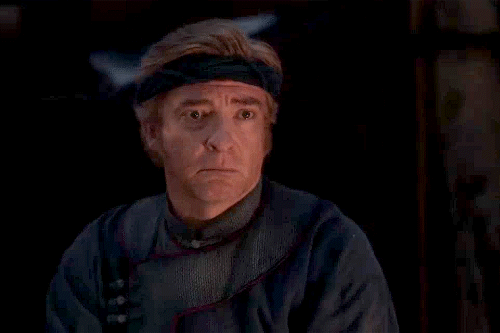
His first scenes with Ed after Ed has woken up have him back in the same shirt and trousers. In terms of plot, he's not had a chance to get any new clothes, but this is also symbolic - he's approaching his relationship with Ed without any of the clothes that he'd hidden in, or in which Ed had fallen in love him. It's just him. It's significant that it is in this guise that Ed accepts him again, and their relationship begins to move forward.
I think it's also significant that, where Stede has so defined himself by his clothes, Ed often sees him out of them, first when they meet, again when he appears as the mermaid. In neither case is this presented as explicitly sexual - in one Stede's half dead, in the other he's a fantasy image - though there is an undercurrent of desire. Ed doesn't define Stede by his clothing.
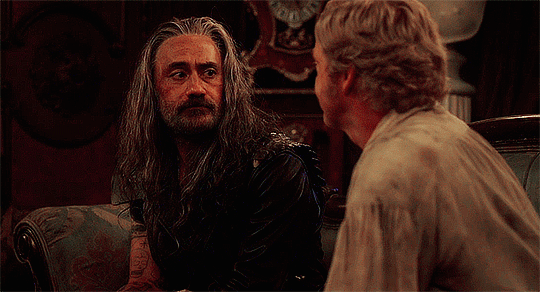
The next big shift is to the cursed suit, and the first time that we see Stede shifting his focus from Ed and the Revenge to finery again. He fully indulges his foppery here, posing in front of the mirror, whipping the tails of the suit around, asking everyone to admire what a great suit it is. But it's a different kind of foppery to what we see in Season 1 and the use of his outfits as disguise. Here it becomes more an expression of himself and how he feels - he's confident, he's happy, he's not buttoned up to the neck but wearing an open collar revealing more of his chest and body.
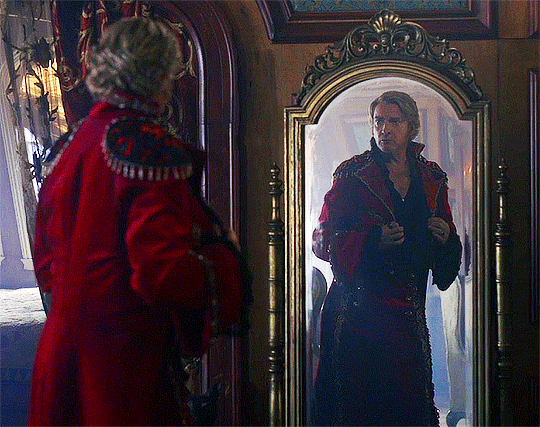
It's important here that the fine things don't stop being important to Stede; he doesn't just stop loving them now that he's out from the weight of his class. But he does become more comfortable in them. The cursed suit makes him into a peacock - it lets him strut around, change his posture, and he's honestly bereft when he has to give it up. But he does give it up - it's not as important to him as it once was.
But. He keeps the shirt. It's a piece of finery that he doesn't have to give up - a compromise with the crew - and he wears it into the next episode. Ed remarks on it; it's the shirt that leads to the "you wear fine things well" callback, the same color and fabric as the handkerchief Ed kept, and leads to their first kiss on deck.
Ed's comment is more than that, though - from the start of Season 1, Stede's clothes have been his form of self-definition and disguise. It's one of the first things that Ed and he talk about. Stede has now lost, or Ed has destroyed, most of those fine things that weighed him down (the hidden closet of a repressed gay man). The shirt is Stede retaining his love of fine things, a love that Ed admired and never found strange or offensive as others did but that wasn't what made him fall in love with STede. Ed's comment doesn't just recall that first night on deck; it recalls the entire beginning of their relationship, the love that they both share and that Ed himself tried very hard to (literally) throw overboard. But it's also not the only thing that makes Stede who he is. "You wear fine things well" is about the person, not the things. It is Ed taking Stede as he is, and loving him as he is.
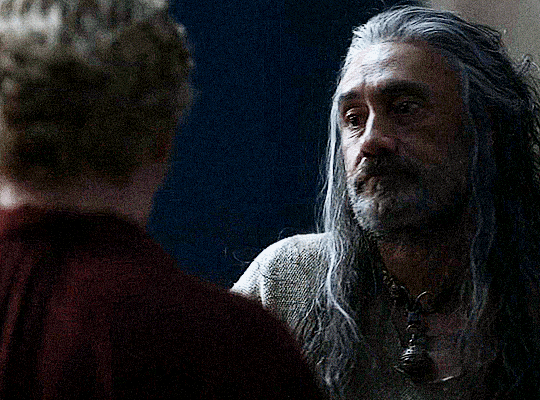
All of this confirms what I think is a lingering fear Stede has - that Ed might not love him as he is. They first bond over fine things, but Ed loves Stede in the dirty white shirt he's been wearing for months, and in the red silk shirt, and in the blue shirt covered in the blood of their enemies. He fell in love with Stede in the finery, but loves him in anything.
Following the "cursed suit" incident, Stede obtains new clothes, but they're not the armor or disguises of his old wardrobe. He gets leather trousers that allow him to wear a sword and gun, and nice shirts of good fabric that let him work on deck, roll up his sleeves, wear gloves. He no longer buries himself in protective layers. His clothes reveal more of his body - without being artificially cinched at the waist or layered over his chest - showing off his chest and arms. They're appropriate to the world he now lives in, and expressive of his increasing confidence and his developing relationship with Ed. He's a man more at ease with his own body, who isn't afraid to reveal who he is not just to Ed, but to everyone he encounters. He's no longer ashamed of his sexuality. He's cast off the armor.

#ofmd s2#ofmd#ofmd season 2#our flag means death#stede bonnet#ed teach#gentlebeard#blackbonnet#ofmd meta#as someone who started writing about media in the dark ages#man i like having access to good gifs to illustrate points#gif makers are the best#cursed suit#rhys darby#taika waititi
162 notes
·
View notes